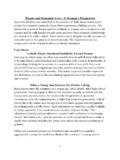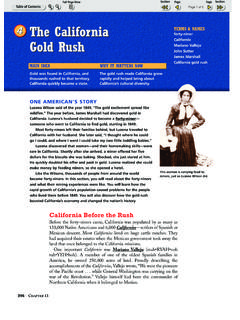Transcription of Narcissism in the Pulpit - Leaving the Priesthood
1 1 From: Narcissism in the Pulpit (Originally Published by Power2 Serve Resources, Lumsden, SK, Canada. It has also appeared, in part or in full, on various other online, electronic resources including "The Church Law Campaign." It has been reproduced here in full and with only slight formatting and grammtical edits. Epiclesis does not claim copyright ownership of this material. Text notes refer to a bibliography at the bottom of the article). Generally most church conflict is caused by carnality, selfishness and ambition (1 Cor 3:3). Combine these sinful behaviors with an antagonist or two and you can have serious conflict problems. Add selfish ambition to these characteristic in the Senior Pastor and spiritual abuse can be meted out in sinful, and destructive ways.
2 But there is one unbearable situation that unfortunately occurs too often within the church that I wish to discuss: That of a pastor with a personality disorder shepherding (or pretending to shepherd) the church body. Generally, individuals that manifest serious personality disorders such as schizophrenia, paranoid, borderline, etc., are not stable enough to survive in leadership positions. But due to the nature of the pastorate and the way in which pastors are called and dismissed, there is one personality that somehow manages to survive in the pastorate that of the Narcissistic Personality Disorder (NPD). Generally it takes a long time before this devious individual is identified for who and what he really is, and some of the most gifted are able to survive for years in one location.
3 Many though will have short tenures. Depending on the size of the congregation and the perceptiveness of the leadership it may take 6 months to a couple of years before the problem is clearly perceived that the pastor is devoid of spiritual depth, personal character, and really could care less about the welfare of the sheep. If the destructive characteristics are not identified and the narcissist is allowed to minister long range serious problems will manifest. The NPD pastors can be very abusive and destructive to the church, and wreak havoc in the personal lives of those closest to them particularly staff and leadership. What is Narcissistic Personality Disorder? The key term to describe a narcissist is self-aggrandizement. All of us to one degree or another manifest some narcissistic characteristics, particularly when we are younger or in our youth, but most of us grow out of it as we mature.
4 There are those, though, who because of their unique temperament, combined with improper upbringing and training that often includes trauma, who develop warped belief structures about themselves and others by their teen years. Unfortunately they not only do not grow out of it, but they become firmly entrenched and concerned with Me, My, I, and Myself. They live out a life of It s all about Me: my wishes, my desires, my kingdom In essence another person with a certifiable personality disorder is unleashed upon the world. One mistaken belief is that a narcissist is in love with himself, but in reality he is in love with an image of himself-- an image he creates and believes about himself based upon his perception of how he perceives that other people view him.
5 Unfortunately, to love only images renders the individual unable to really love and care for the person who is behind the image. The narcissist does not really love himself or others around him. He loves his projected image and the image he projects onto others (more about this later). 2 A personality disorder is a repeatable pattern of abnormal behavior that doesn't change even though it upsets and causes emotional trouble with other people at work and in personal relationships. "It is not limited to episodes of mental illness, and it is not caused by drug or alcohol use, head injury, or illness. There are about a dozen different behavior patterns classified as personality disorders by DSM-IV. All the personality disorders show up as deviations from normal in one or more of the following areas: 1.
6 Cognition-- , perception, thinking, and interpretation of oneself, other people, and events 2. affectivity-- , emotional responses (range, intensity, lability, appropriateness) 3. interpersonal functions 4. impulsivity." (Ashmun) The online UK Dictionary of Psychology defines the narcissistic personality as: Extremely selfish and self-centred, people with a narcissistic personality have a grandiose view of their uniqueness, achievements, and talents and an insatiable craving for admiration and approval from others. They are arrogant, exploitative to achieve their own goals and expect much more from others than they themselves are willing to give. The World Health Organization, in its ICD-10 Classification of Mental and Behavioral Disorders, describes Narcissism : Narcissistic Personality Disorder is a disorder in which a person has a grandiose self-importance, preoccupation with fantasies of unlimited success, a driven desire for attention and admiration, an intolerance of criticism, and disturbed self-centered interpersonal relations.
7 They are often referred to as being conceited. They generally have a low self-esteem as well. They act selfish interpersonally, with a sense of entitlement. Sam Vaknin, described by the New York Times as the world s leading expert on Narcissism , describes Narcissism : Narcissistic Personality Disorder (NPD) is an all-pervasive pattern of grandiosity (in fantasy or behaviour), need for admiration or adulation and lack of empathy, usually beginning by early adulthood and present in various contexts. Five (or more) of the following criteria must be met: 1. Feels grandiose and self-importance ( , exaggerates achievements & talents to the point of lying, demands to be recognized as superior without commensurate achievements). 2. Is obsessed with fantasies of unlimited success, fame, fearsome power or omnipotence, unequalled brilliance (the cerebral narcissist), bodily beauty or sexual performance (the somatic narcissist), or ideal, everlasting, all-conquering love or passion.
8 3. Firmly convinced that he or she is unique and, being special, can only be understood by, should only be treated by, or associate with, other special or unique, or high-status people (or institutions). 4. Requires excessive admiration, adulation, attention and affirmation-- or, failing that, wishes to be feared and to be notorious (narcissistic supply). 5. Feels entitled. Expects unreasonable or special & favorable priority treatment. Demands automatic and full compliance with his or her expectations. 6. Is "interpersonally exploitative", , uses others to achieve his or her own ends. 7. Devoid of empathy. Is unable or unwilling to identify with or acknowledge the feelings and needs of others. 3 8. Constantly envious of others or believes that they feel the same about him or her.
9 9. Arrogant, haughty behaviours or attitudes coupled with rage when frustrated, contradicted, or confronted. "The overall definition of someone with a narcissistic personality disorder is characterized by a combination of severe limitations in understanding other people and their feelings, as well as an excessive pursuit of what are called narcissistic supplies, such as admiration, attention, status, understanding, support, money, power, control, or perfection in some form. While all of us need these supplies in adequate amounts to feel a sense of well being, the narcissist pursues them with an unrelenting desperation and a keen ability to manipulate others. Meanwhile the outer persona of the NPD individual is generally one of confidence and control, alongside a smooth or charming demeanor.
10 As your involvement with the narcissist develops you will notice that the relationship increasingly becomes one-way with you in the primary giving position." (Payson, ) If you have encountered a narcissist in your world, you may be able to identify what you have been dealing with from just the above descriptions. You may have just have had an "ah-ha" experience, as I did when I first began researching this personality. Or you may yet be unsure Sam Vaknin states: It is close to impossible (to immediately recognize a narcissist) and that is the secret of their astounding success. Narcissists are good actors. They are adept at charming others, persuading them, manipulating them, or otherwise influencing them to do their bidding. The narcissist's sense of self-worth is unstable (labile), so the narcissist relies on input from other people to regulate his self-esteem and self-confidence.






